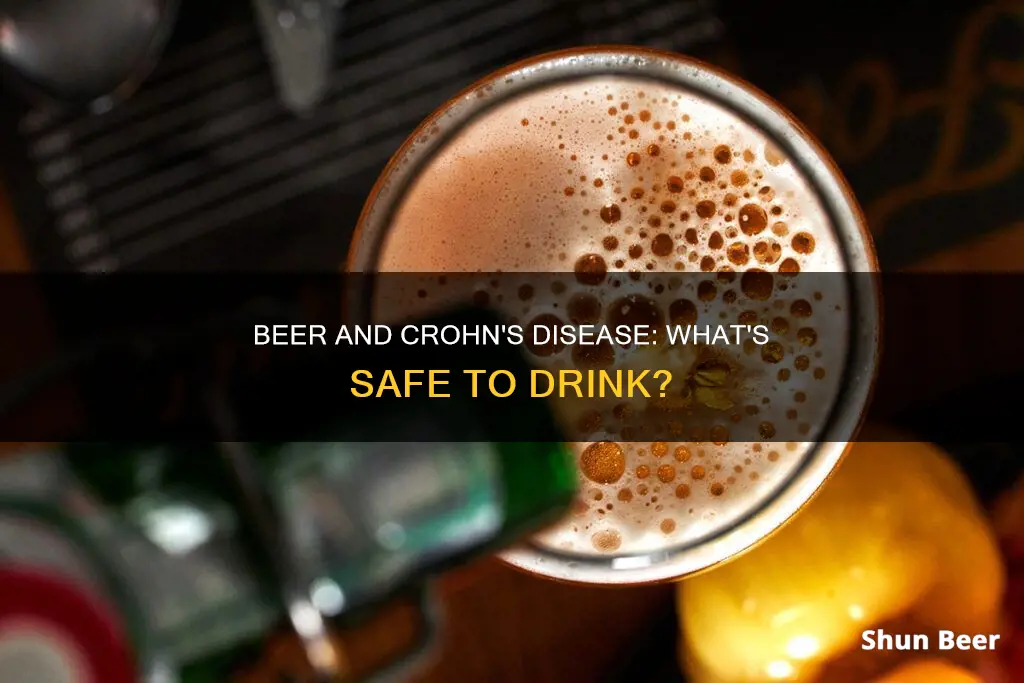
Crohn's disease is a type of inflammatory bowel disease (IBD) that affects the gastrointestinal tract, most commonly the small and large intestines. While alcohol does not cause Crohn's disease, it can trigger flare-ups and worsen symptoms. Alcohol can irritate and inflame the lining of the gastrointestinal tract, disrupting the intestinal barrier and increasing gut permeability, which can lead to diarrhoea. It can also affect the balance of bacteria in the gut, potentially increasing the risk of intestinal permeability and triggering an immune response, which can further exacerbate symptoms.
In addition, alcohol can interfere with certain medications used to treat Crohn's disease, such as metronidazole and antibiotics. It is recommended to consult a doctor or healthcare professional to understand the potential risks and interactions between alcohol and specific medications.
While there is no simple rule regarding alcohol consumption for individuals with Crohn's disease, moderation is generally advised to minimise the negative impacts on gut health and flare-ups.
| Characteristics | Values |
|---|---|
| Can you drink beer with Crohn's disease? | Beer can be consumed in moderation, but it is not recommended during a flare-up. Beer can cause diarrhoea, abdominal pain, and discomfort. |
| Alcohol and Crohn's disease | Alcohol can cause Crohn's flare-ups and worsen symptoms, but the effects vary from person to person. Alcohol can negatively affect gut health and increase the risk of gastrointestinal complications. |
| Alcohol and gut health | Alcohol can impair the absorption of nutrients and disrupt the balance of gut bacteria. |
| Alcohol and gastrointestinal complications | Alcohol can cause gastrointestinal symptoms such as diarrhoea, abdominal pain, and rectal bleeding. It can also irritate and inflame the lining of the gastrointestinal tract. |
| Alcohol and Crohn's medications | Alcohol may interfere with certain medications used to treat Crohn's disease, such as metronidazole and antibiotics. |
| Alcohol and stress | Drinking alcohol can be a cause and effect of stress and anxiety, which can trigger Crohn's flare-ups. |
| Types of alcohol | Sugary and carbonated alcoholic drinks, including beer, may increase abdominal pain and discomfort. Red wine has been linked to long-term risks of relapse and flare-ups. |
What You'll Learn

Alcohol can cause Crohn's flare-ups
Alcohol can irritate the lining of the gastrointestinal (GI) tract, increasing intestinal permeability and triggering inflammation. This can lead to abdominal pain, diarrhoea, and rectal bleeding. Alcohol is also a diuretic, which can cause dehydration and worsen diarrhoea. In addition, alcohol can impair the absorption of important nutrients, including vitamin B12, vitamin B1, folic acid, and zinc, which can further exacerbate malnutrition in those with Crohn's disease.
The type of alcohol consumed also matters. Sugary and carbonated alcoholic drinks, such as mixed drinks, beer, and cola, can act as laxatives and cause abdominal pain and bloating. Beer, in particular, tends to be consumed in higher volumes, increasing the likelihood of diarrhoea. Red wine, on the other hand, has been found to have anti-inflammatory properties and is associated with an increase in anti-inflammatory bacteria. However, it can also contribute to intestinal permeability, which can lead to flare-ups in the long run.
The impact of alcohol on Crohn's disease is complex and varies from person to person. While some people may experience no symptoms, others may have severe reactions. It is essential for individuals with Crohn's disease to monitor their alcohol consumption and be mindful of their body's responses. Consulting with a healthcare professional is crucial to understanding how alcohol affects their specific condition and how to best manage it.
Beer and Folic Acid: Is It Safe to Drink?
You may want to see also

Drinking alcohol makes dehydration more likely
Drinking alcohol can make dehydration more likely for several reasons. Firstly, alcohol is a natural diuretic, which means it stimulates urination and can leave you dehydrated. This is particularly problematic for people with Crohn's disease, who are already at risk of dehydration due to frequent bowel movements and diarrhoea. Alcohol can worsen diarrhoea, further increasing the risk of dehydration.
In addition, people with Crohn's disease may be more prone to vomiting after drinking alcohol since it irritates the gastrointestinal (GI) tract, which is already susceptible to irritation from the disease. Vomiting can also lead to dehydration.
Furthermore, carbonated alcoholic drinks like beer can cause bloating and a gassy feeling, which may contribute to gastrointestinal discomfort and make it harder to retain fluids.
Overall, while moderate alcohol consumption may be safe for people with Crohn's disease, it is important to be aware of the risk of dehydration and take appropriate precautions, such as drinking water along with alcoholic beverages and monitoring fluid intake to ensure adequate hydration.
Beer and Fentanyl: A Risky Mix?
You may want to see also

Alcohol consumption can worsen gut health
Alcohol consumption can have a detrimental impact on gut health, especially for those suffering from Crohn's disease. Here are some ways in which alcohol can worsen gut health:
Malnutrition and Impaired Absorption
Alcohol consumption can impair the body's ability to process and absorb essential nutrients such as vitamin B12, vitamin B1 (thiamine), folic acid, and zinc. This is particularly concerning for individuals with Crohn's disease, who may already struggle with malabsorption and malnutrition due to the disease's impact on the gastrointestinal tract.
Disruption of Gut Bacteria
Gut health relies on maintaining a healthy balance of bacteria in the digestive tract. Alcohol can disrupt this delicate balance, affecting the amount, diversity, and equilibrium of gut bacteria. This disruption can have negative consequences for overall gut health and increase the risk of gastrointestinal issues.
Increased Gut Permeability and Intestinal Inflammation
Alcohol can irritate and inflame the lining of the gastrointestinal tract, leading to increased gut permeability, also known as "leaky gut." This allows partially digested food, toxins, and germs to enter the intestines, triggering inflammation and exacerbating the symptoms of Crohn's disease. Red wine, in particular, has been associated with increased intestinal permeability, which can lead to flare-ups over time.
Diarrhea and Dehydration
Alcohol acts as a diuretic, which can lead to dehydration. Additionally, it stimulates the intestines, contributing to diarrhea. These effects can be particularly problematic for individuals with Crohn's disease, who are already at risk of dehydration due to frequent bowel movements and diarrhea associated with the condition.
Gastrointestinal Complications
Chronic alcohol consumption is linked to an increased risk of gastrointestinal complications, including liver disease and damage to the GI tract. Alcohol can also cause gastritis, or inflammation of the stomach, which can further aggravate the symptoms of Crohn's disease.
Interference with Medications
Alcohol may interfere with medications used to treat Crohn's disease, especially antibiotics such as metronidazole (Flagyl). Consuming alcohol while taking these medications can lead to negative side effects, including nausea, cramping, vomiting, and headaches. It is crucial to consult with a healthcare professional to understand the potential interactions between alcohol and any prescribed medications.
Drinking Non-Alcoholic Beer in Public: Is It Okay?
You may want to see also

Alcohol increases the risk of gastrointestinal complications
Alcohol can irritate and inflame the lining of the gastrointestinal tract, which is meant to keep toxins out and absorb nutrients into the bloodstream. This irritation can lead to rectal bleeding and poor nutrient absorption.
Alcohol is also a diuretic, which means it dehydrates the body and can cause diarrhea by stimulating the intestines. Dehydration can be dangerous for people with Crohn's disease, as they are already at risk of dehydration due to frequent bowel movements and diarrhea.
In addition, alcohol can disrupt the balance of healthy bacteria in the intestines, which is important for maintaining gut health. It can also impair the body's ability to absorb key nutrients such as vitamin B12, vitamin B1, folic acid, and zinc, leading to further malnutrition in people with Crohn's disease.
Furthermore, alcohol can interfere with medications used to treat Crohn's disease, such as metronidazole and other antibiotics. Mixing alcohol with these medications can cause nausea, cramping, vomiting, and headaches.
Overall, while alcohol may not be a direct cause of Crohn's disease, it can increase the risk of gastrointestinal complications and worsen existing symptoms. It is important for individuals with Crohn's disease to consume alcohol in moderation and consult with their healthcare provider to ensure safe consumption.
Beer and Leaky Gut: What's the Connection?
You may want to see also

Drinking alcohol to reduce stress can cause flares
If stress seems to make your Crohn's symptoms worse, cutting out alcohol or reducing your intake may help lower your stress levels and thus reduce flares. Alternative stress relievers, such as meditation, might help manage your anxiety and won't induce anxiety.
Additionally, alcohol can cause intestinal permeability, also known as leaky gut, which can lead to flare-ups and worsen symptoms. Alcohol can also negatively impact gut health by disrupting the balance of bacteria in the digestive tract and impairing the body's ability to absorb key nutrients.
It is important to note that the effects of alcohol on Crohn's disease vary from person to person, and there is no one-size-fits-all approach. Consulting with a healthcare professional is essential to understanding how alcohol may affect your specific condition and how to best manage it.
Beer and Phentermine: Is It Safe to Mix?
You may want to see also
Frequently asked questions
Alcohol can be consumed by people with Crohn's disease, but only in moderation. Beer, in particular, can set off diarrhoea because people tend to drink more of it than they would wine or spirits. It's best to avoid drinking during a flare-up.
Alcohol can irritate the lining of the gastrointestinal tract, making the gut more leaky. It can also affect the absorption of nutrients and disrupt the balance of bacteria in the gut. Alcohol can also negatively interact with certain medications used to treat Crohn's disease.
Yes, herbal teas are recommended for people with Crohn's disease, as are electrolyte drinks and coconut water.







